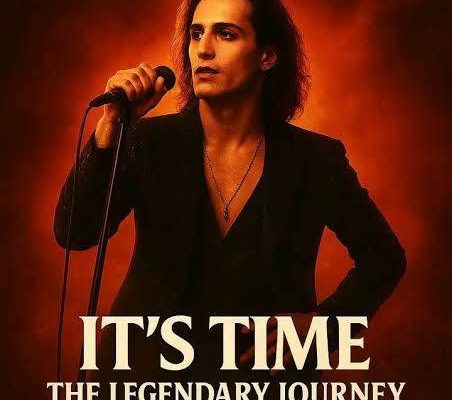Netflix has once again captured the pulse of modern music with its latest documentary, “Måneskin: Rhythm of Rebellion.” The film dives deep into the electrifying world of the Italian rock sensation that has stormed global stages, reshaped the meaning of modern rock, and redefined what it means to be fearless artists in a world obsessed with conformity. Through stunning visuals, intimate interviews, and never-before-seen backstage moments, Netflix crafts a thrilling portrait of a band that started as street performers and evolved into an international phenomenon. From their raw beginnings on the cobblestone streets of Rome to their conquest of the world’s biggest arenas, this documentary doesn’t just chronicle their success—it captures their soul.
“Rhythm of Rebellion” opens with a sequence that feels almost poetic in its simplicity: Måneskin, still teenagers, playing covers on the streets of Via del Corso. The sounds of coins hitting their guitar cases blend with laughter, traffic, and the chaotic rhythm of the city that birthed them. It’s a nostalgic reminder of how pure ambition can light a fire even in the unlikeliest corners. Then, with a sharp cut, the film thrusts viewers into the deafening roar of a sold-out stadium—a juxtaposition that perfectly captures the band’s meteoric rise. The energy is palpable, and even through a screen, you feel the pulse of a movement that’s more than music—it’s defiance in its purest form.
The documentary takes its time exploring each member’s journey. Damiano David, the enigmatic frontman whose charisma commands attention, reflects on the pressures of fame and the toll it takes on authenticity. His voice is calm but heavy with introspection as he admits that success doesn’t always silence doubt. Victoria De Angelis, the band’s fierce bassist and driving creative force, speaks candidly about identity, gender, and breaking barriers in an industry still dominated by stereotypes. Guitarist Thomas Raggi and drummer Ethan Torchio bring the emotional balance, their words grounding the band’s wild energy with a quiet sense of purpose and brotherhood. Together, they speak of love, rebellion, exhaustion, and the relentless hunger to create something real in a world of imitation.
Netflix’s production style elevates their story beyond a standard rock documentary. Every frame feels intentional—dark, luminous, and seductive all at once. The cinematography captures the grit of rehearsals, the ecstasy of live performances, and the fragile silence that follows once the lights dim. The editing interlaces performance footage with candid moments—arguments, laughter, creative clashes—that remind viewers that Måneskin’s bond isn’t perfect, but it’s genuine. In a time when many artists are manufactured for the spotlight, “Rhythm of Rebellion” reveals a band that forged its own fire from the raw steel of ambition, friendship, and pain.
The film delves into the band’s breakthrough on X Factor Italia, the moment that transformed their lives. Their performance of “Beggin’,” the cover that would later become a global hit, marked a cultural shift. Viewers see behind-the-scenes clips of the tension before they step onto the stage—Damiano pacing like a caged animal, Victoria tuning her bass with a steady intensity, Ethan breathing deeply in rhythm, and Thomas smiling nervously. Then the lights hit, and they explode with sound. Watching it unfold with Netflix’s remastered visuals, even those familiar with the performance feel the rush anew. The documentary captures that pivotal moment when talent, charisma, and timing collided to create destiny.
But what makes this film stand out is its unflinching honesty. Måneskin’s journey is not portrayed as a straight climb to glory. “Rhythm of Rebellion” exposes the emotional chaos behind success—the burnout, the scrutiny, and the fear of losing one’s essence. When the band won Eurovision 2021 with “Zitti e Buoni,” they didn’t just win a competition; they detonated a cultural bomb. Suddenly, the entire world was watching an Italian rock band with androgynous fashion, unapologetic sensuality, and an unfiltered attitude. The film captures their post-Eurovision whirlwind: interviews, travel, exhaustion, and the surreal realization that their music had crossed borders they never imagined. Damiano recalls a moment backstage after a show in Los Angeles when he looked at his bandmates and whispered, “We did it.” That moment, he says, felt both triumphant and terrifying—because once you’ve reached the top, there’s nowhere higher to go.
Throughout the documentary, Netflix balances spectacle with introspection. There’s a recurring motif of reflection—mirrors, windows, and dimly lit hotel rooms. Between high-energy sequences of concerts and tours, the camera lingers on solitary moments: Damiano writing lyrics alone, Victoria meditating before a performance, Ethan recording rhythms in silence, Thomas sketching chords in the dark. These scenes reveal the psychological weight of fame, the loneliness that shadows even the loudest applause. Måneskin’s members speak about how the band became both their freedom and their cage. Yet, their resilience—their refusal to conform—is what keeps their art alive. They thrive on tension, turning conflict into creation, and chaos into beauty.
The music, of course, is the beating heart of the film. From the primal riffs of “Zitti e Buoni” to the seductive pulse of “I Wanna Be Your Slave,” every track is presented not just as a performance but as a story. Netflix’s sound mixing places viewers right in the center of the storm—basslines rumbling through your chest, vocals slicing through the air, and drums thundering like a heartbeat. Even for fans who’ve seen Måneskin live, the documentary offers new depth; every song feels reborn through the lens of experience. There’s also a touching segment where the band revisits their earliest demo recordings, laughing at their old mistakes but also marveling at how much of their essence was already there: raw, fearless, and unmistakably theirs.
Another standout aspect of “Rhythm of Rebellion” is how it contextualizes Måneskin’s global impact. The film doesn’t shy away from addressing cultural barriers and backlash. It highlights how their unapologetic style—blending gender fluidity, sensuality, and rebellion—challenged traditional norms in both Italy and abroad. Critics called them too provocative, too loud, too different. But those criticisms became fuel. Victoria’s voice breaks slightly as she says, “We were told we couldn’t make it because we weren’t what people expected rock to be. That’s exactly why we had to make it.” The film positions Måneskin not just as musicians, but as icons of a new generation that refuses to be defined by old rules.
One of the most emotional sequences comes midway through, when the band returns to Rome after months on tour. They walk through familiar streets now lined with fans and cameras. There’s joy, but also melancholy—the realization that they can never go back to anonymity. A quiet dinner scene follows, filmed in warm tones, where the band reminisces about the days they played for passersby. Damiano raises a glass and says, “We were free then. But we’re still free now—just louder.” The line encapsulates the paradox of their fame: their rebellion has become both their brand and their burden.
As the film progresses, the tone darkens. The pressures of global fame begin to weigh heavily. We see cracks forming—creative disagreements, fatigue, the struggle to maintain authenticity while navigating commercial expectations. Netflix doesn’t sanitize these moments. The band’s arguments are raw and real, their vulnerabilities laid bare. Yet, even in their conflicts, there’s love—a shared understanding that their power lies in their differences. “We fight because we care,” Thomas says quietly. “If we stop fighting, that means we’ve stopped believing.” Those words hang in the air like a promise.



